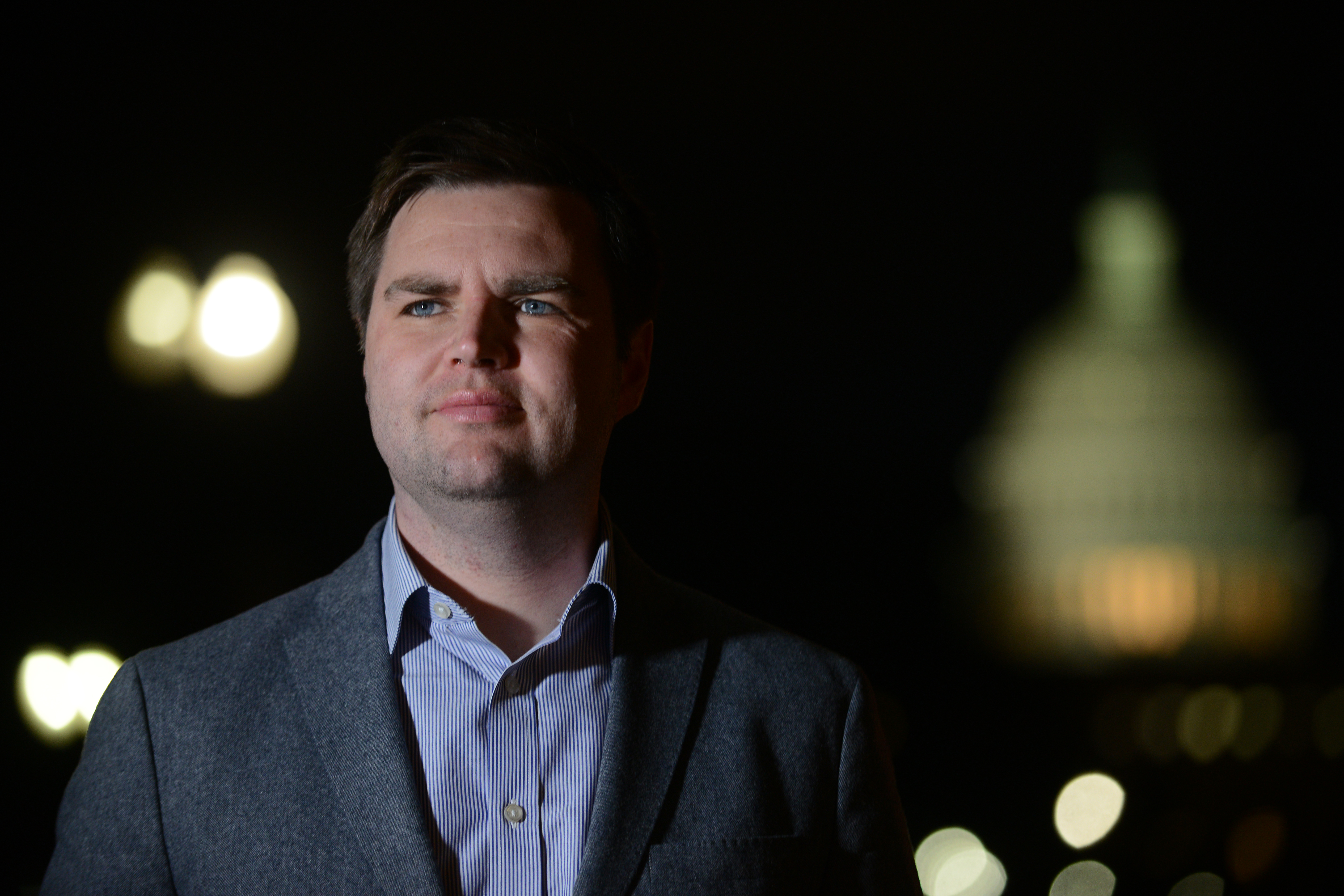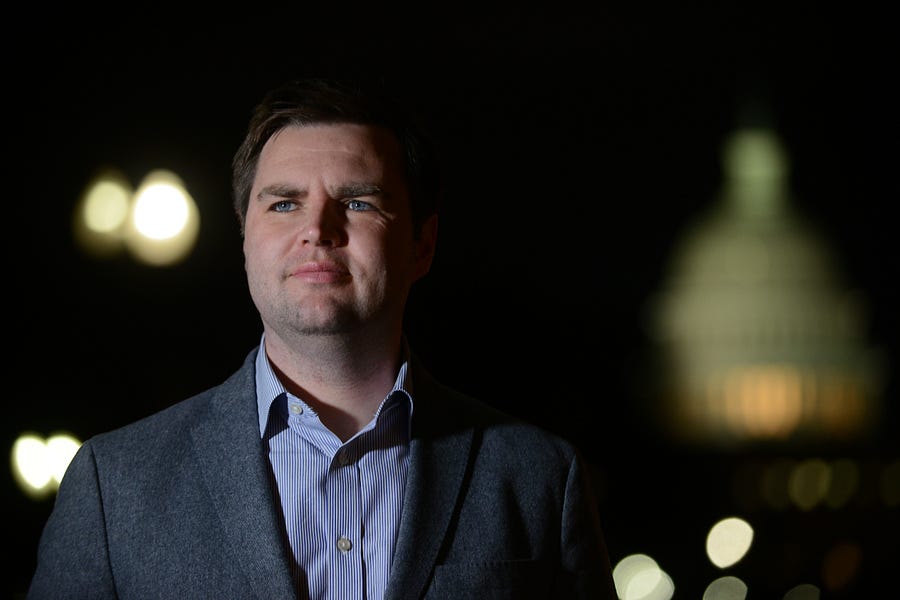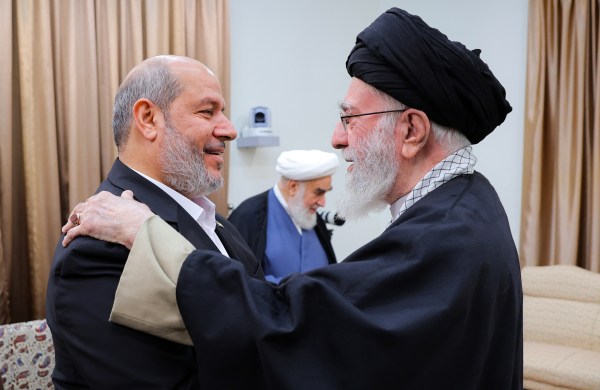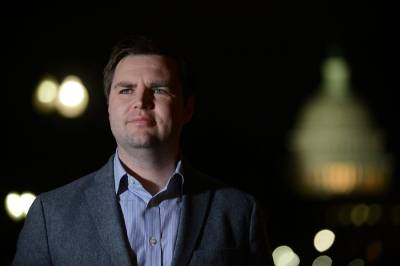In a French Press change of pace, I’m sending a rather unique newsletter today. As you’ll read below, I had the honor of interviewing Ron Howard and J.D. Vance in advance of the release of their Netflix film based on J.D.’s bestselling book, Hillbilly Elegy. It’s a powerful movie, and the interview below is fascinating. We put it on our home page this morning, but it also deserves the specific French Press audience. Enjoy!

Earlier this week I had the opportunity to watch Ron Howard’s adaptation of J.D. Vance’s memoir Hillbilly Elegy. Vance’s book, a compelling story of a working-class childhood in Kentucky and Ohio, made an extraordinary impact. It shot to the top of the bestseller lists and remained a bestseller for weeks on end.
Before Hillbilly Elegy there had been a number of books that had explained the challenges of white working-class families in Appalachia and the Midwest in sociological and economic terms, but Vance’s book was personal. In many ways it functioned as the memoir of an era. And now it’s a movie.
The film stars Glenn Close and Amy Adams as Vance’s grandmother and mother, and Owen Asztalos and Gabriel Basso as Vance during his childhood and during his time at Yale Law School. The movie was profoundly moving, and after watching it, I had the privilege of chatting about the film with director Ron Howard and with Vance. We had a fascinating and wide-ranging discussion that I’ve reproduced below—with edits for length and clarity.
Warning. There are spoilers in our discussion, but since I’m interviewing them about a wildly popular memoir about a public figure, I don’t think I have to keep secrets about the twists and turns of J.D.’s story. If you want suspense as you watch it, skip this discussion and come back to it after you’ve seen it. But if you want a fascinating conversation about an important film, read on.
To prime the pump for the conversation, watch the trailer below and ask yourself, if you didn’t know Glenn Close starred in the movie, would you be able to tell who she is?
David French: Let’s just start off with the most softball of softballs, Ron. What drew you to this project? This book really hit a moment in American history. I always viewed it as one person’s story that explained a lot about America. But I was curious as to what drew you to this?
Ron Howard: I read the book initially because it was perceived as offering insight into an overlooked community in our society. My parents were from very rural parts of the country. My mom was from a tiny town called Duncan in Oklahoma. My dad was a farm boy moving back and forth between the Oklahoma-Kansas border with his folks. Though my family is from Oklahoma and Kansas, not Appalachia, they fit into that category.
I found the book’s sociopolitical stuff interesting, absolutely, but I really connected with the family story. Not because any one character aligned with a character from my extended family, per se, but because the sensibility and some of the issues that the family faced echoed with me.
For quite a long time, I’ve been looking for a story whose characters inhabited a world that was so familiar to me in that way. I hadn’t utilized that aspect of my upbringing and my sensibilities and understanding and hadn’t found the right story. I wanted to do something contemporary, but I didn’t really know what.
When I talked to J.D., he just sounded like a couple of cousins of mine. Not exactly, but I mean, the cadences and the inflections. It just felt really familiar. J.D. was forthright, because he didn't necessarily know if [the book] even should be adapted. We just started talking about it, and I started to ask some follow-up questions to get beyond what I learned from the book. I began to really believe in this family. This is a family story, a very relatable family story though particular to the culture.
David French: Amy Adams’ portrayal of J.D.’s mom was a gut punch, especially for anybody who has seen addiction up close. There’s a contradiction that seems to exist between objectively terrible actions and enduring love. I rarely have seen such a brilliant performance of a character committing such empirically awful acts, while not causing the audience to hate her. You want what’s best for her. J.D., was it emotional to watch that portrayal on screen?
J.D. Vance: I’ll try to be brief, because that’s a very long answer. I agree with what you just said, David. I mean, this is coming from a very emotional place too, because I actually watched the movie with mom last night. There was some debate about whether she would watch it by herself. Finally, she wanted to watch it with me, and we watched yesterday.
I really started to appreciate the professionalism of these actors. Amy spent a lot of time with my mom, who was very apprehensive about how she would be portrayed. Ultimately, she got comfortable with it—in part—because of Amy’s approach which gives [the audience] the woman, the story. It wasn’t that mom was a bad person. She was a person who went astray in important ways and, and kind of really struggled to find her way back to the straight and narrow.
Ron Howard: The whole time, even in the roughest parts of the movie, you’re still just rooting for the mom. That’s all I wanted in the movie, and I think I definitely got that. It's good to hear that you got that, David. Most people who watch it, hopefully, will get the same thing … that this is a fundamentally good person trying to find a way in a pretty complicated world. This is not a black hat/white hat kind of narrative. It’s about life, and life is pretty messy.
It’s really a rescue and survival story. It’s not exactly about self-actualization, which J.D. is very open about. Of course he had to have the strength, ultimately make decisions, and have the ability to pull himself out of some patterns within his family and culture which could’ve entrapped him. But he didn’t do it alone.
David French: The actor, Owen Asztalos who played young J.D., did just a really great job portraying him as a kid with a good heart and instincts. However, this is not an up-from-the-bootstraps story, because of that rescue element you mentioned, Ron. It’s kind of like he was yanked up by Mamaw and, and sustained by [J.D.’s sister] Lindsay and [J.D.’s wife] Usha. It was an incredibly true-to-life-portrayal about how lives are really changed. It’s not that there’s a huge number of kids who have this incredible ability to withstand all of these headwinds. Somebody’s got to reach in and yank them out.
Ron Howard: I thought it was really important that the Mamaw character was, on her own, practically a reason to make a movie. One thing I could not have predicted—and I'm finding now that we’re beginning to show the movie and have test screenings and whatnot—was how universal the conflicts, the emotions, the semantics of this story actually turned out to be.
We finished our first master shots on a scene and I could hear different crew members talking about how close it was to their lives. These were people from all corners of the country with every accent. I began to realize, of course, that every culture has its specific set of familial patterns, attitudinal patterns. Some of them are genuine building blocks offering strength and should be relied upon. Other ones, especially as society shifts and times change, become outdated and become negative baggage, something to overcome because it doesn’t apply anymore.
Of course, every culture has it. It’s all of our jobs to build on the good and figure out what can be approached differently and better. This is an interesting case study in that.
David French: I had to rewatch the first seven minutes to figure out which character was being played by Glenn Close. I didn’t recognize her. J.D., I thought her portrayal was of somebody who both perpetuated cycles of dysfunction yet ultimately was indispensable in breaking those cycles of dysfunction.
J.D. Vance: I'll never forget the moment where we all saw [Glenn Close playing Mamaw] for the first time. We—including my aunt—gasped and started crying. My mom was very quiet and uncle Jimmy—who is not a very emotional man, who is really stoic and quiet—was even taken aback. She had a way about every little thing, the way she held her cigarette, the way her face twitched, when she would get annoyed, the way she walked—it was just an incredible re-creation of Mamaw.
I love to think I’m not an especially emotional person, but there were a few scenes that [emotionally affected] me: certainly when she was lying in bed for her final minutes, the scene where she’s grabbing the homework and sitting on the chair by herself sort of admiring and feeling the relief when the things were going in the right direction.
David French: J.D., there’s a great fish-out-of-water scene early on when you're about to sit down and eat [with attorneys from elite law firms] and don’t know which fork to use. I had an identical moment in law school, so I called a friend of mine from college and asked, “what the heck do I do in these formal settings?”
Ron Howard: I was at the U.K. premiere afterparty for Apollo 13, and I was sitting next to princess Diana and I grabbed her bread.
David French: That’s fantastic.
J.D. Vance: I’ve never fully gotten it squared away so I can relate.
David French: So offending a law partner’s not quite the same as offending royalty, but J.D., was that fish out of water feeling a sustained experience for you at Yale?
J.D. Vance: Yeah, it was. That is almost 100 percent how it happened to me in my real life. The main theme of the book actually is the idea that climbing the social ladder comes with these really culturally uncomfortable moments … where you find yourself completely unsure how to conduct yourself and you feel like you don’t quite belong.
David French: In the book, religion was both everywhere and nowhere. The movie starts with you listening to a sermon on a radio. You’re not in church. Ron, how were you trying to portray religion in the movie—that there is religion, but there isn’t church? And how that makes a difference in a kid’s life.
Ron Howard: I wish I could claim it with that degree of articulation and specificity. Actually, the editor James Wilcox came up with that, but I have recollections of sermons playing on a radio. For me, it just rang true and felt like something that would happen. Religion informed the family and their sensibilities even when there wasn’t formality around it. Some scenes which didn’t make it into the movie included Mamaw reading her Bible or—if she actually wasn’t reading it—putting it away.
David French: J.D., you had a very public conversion to Catholicism, which is far more structured than the mountain Protestantism of Eastern Kentucky. Has that contrast of structure been meaningful to you?
J.D. Vance: Well, certainly. One of the things that attracted me was the structure, but also the history is grounded in a very self-conscious historical organization. Obviously that sometimes will fail, but you’re very present throughout various times of history which just consequently makes me feel a little bit more anchored. Mamaw’s Christianity, while it wasn’t especially structured, was very much a fixture of how she thought and how she talked to me about various things and certain problems in our lives. I ultimately decided to be in the Catholic church, because it was an organization that was both historically grounded but also, in the present, provided some very real direction.
David French: Ron, young J.D. was a super believable kid. Sometimes I see kids on screens and think that's not the way kids act. You spent a lot of time being directed as a child actor. Has that informed the way you're able to guide other young actors?
Ron Howard: Right. He [Owen Asztalos] lives in Philadelphia. He’ll go be a part of a movie or TV production, but his life is kinda riding his bike, playing hockey, playing guitar, and going to school. I sensed that in his audition tape and then when I met him and his dad.
My father was an actor all his life and was really a gifted communicator when it came to talking through the process of acting and going into character and trying to be honest and connecting yourself to the setting. [He helped me] understand what the characters seem to think, eat, and believe in order to make the decisions they make. I really tried to emulate him in a lot of ways when I'm working with younger actors. I had a lot of good directors, but he was, he was really the reason I was an effective child actor.
Gabriel Basso [the actor who played the older J.D.] was also great. He was from Missouri, and is an interesting guy who acted a lot age 12 or 13 and then didn't want to do that anymore. He wanted to see what was out there, so he went into the military, then was in a punk band, then did a lot of manual labor … carpentry work and all kinds of things. Now, he’s finding his way back into the business. And this was really his first project back.
When I finally landed on those two guys, I felt like we could give you this complete picture. Some of the work I did with them was to get them in the same room and have them trade off playing the parts. Like, I had Gabriel read the young J.D., so that everyone could hear how they would do it, and then I’d have Owen read the adult J.D. [This enabled us to] pull [these performances] into one cohesive personification of everything. And J.D. was able to spend time with him, which meant, you know, a great deal to both of these guys.
David French: J.D., how much time did you spend in the process?
J.D. Vance: There were a few things that I was really focused on. Once the family got comfortable with it and was supportive, I tried to keep in mind I don’t know how to make a movie. Ron Howard does. I was as helpful as I could be, but I also didn’t want to be overbearing. I really wanted there to be positive portrayals of the region’s people and not just dysfunction. Also, I focused on making sure Mom was a relatable, understandable character. That it wasn’t just the bad stuff, that there were also good things and that people appreciated how important she was to me and just how complicated she was as a human being, and is as a human being. That was really important to me.
I didn't care a whole lot whether a particular scene about me was perfectly accurate. Some scenes were close to the book and some of them weren’t. I never truly felt weird about that.
Ron Howard: There were characters who were very important to J.D. who barely show up in this film because they weren’t around, or there wasn’t room to do their subplot within the framework of the greater story within the timeframes I selected. But those people were willing to talk about Mamaw, willing to share their observations, and tell us about what kind of music they were listening to at that time and share family photos. We used those pictures at the end because they played such a significant role.
I appreciated any clarifications J.D. offered up. Occasionally, we’d run some lines by J.D. to see how he’d say them. When he had time, he would dash off a little alternate version, or maybe tweak the words a little bit. That was always very helpful.
J.D. Vance: I think, just one thing to keep in mind, David, on the creative control point is that, to the extent that people really love the movie, of course, it was all my input. If they hate it, it’s all Ron Howard's fault.
Ron Howard: And my shoulders are broad.
David French: Truly last question. You talked about this as a rescue. At the end of the movie—for [J.D.’s] rescue to take place—he had to leave with his mom's hand outstretched. That was a tough moment.
First, because I said earlier, it resonated with people who’ve known people close to them, who’ve struggled with addiction. For me, it wasn’t a mother, it was my best friend. There was a moment when all of us had to leave him with his arm outstretched. That actually set him on a path to sobriety.
Second, the film leaves with her arm outstretched. Then, the caption comes up that she's six years sober. So, you ended with this enormous burst of hope after this moment of despair. I don't really know what I'm trying to say other than, “That was powerful.”
Ron Howard: These decisions are not always black and white. As J.D.’s hand is outstretched and he begins to pull away, he says, “I’ve got to go.” There's just a quick understanding there in his mother's eyes. He can’t muster or articulate the words, but there’s just enough strength to let this happen. And having been through various experiences myself, it’s so great to be able to have that end card. It’s not just the audience that feels good when they see that card come up. I do, too.
David French: It seemed like J.D. was saying, I can't be the rescuer, I have to be rescued.
Ron Howard: Well, he has that line where he says, “I’m not saving anybody.” It’s an incredibly, emotionally precarious place. It's one of the things that people want to talk about afterwards, because they resonated with them in their own way.
David French: J.D., any thoughts on that moment as you were watching it?
J.D. Vance: In real life, that moment happened when we were really living in Cincinnati. One of the core tensions in my life, book, and movie is wanting to take care of family, which you can only do from the position of relative strength. And that was just a position of relative weakness for me.
You gotta get your stuff in order. You've got to have some sense of stability before you can really reach out and help people. That was sort of my takeaway from that low in the movie that is really hard.
There's a part of me that’s almost mad at myself for not staying, but that also recognized that if he had stayed, he might have lost his relationship with Usha. He might lose his one lifeline to financial and vocational stability. And if that happens, then this kid is absolutely no real use to these family members who need him. So it is a very powerful moment, and I think really illustrates the tension that exists in these types of scenarios really well.
Ron Howard: And Mamaw, after the attempted theft of the calculator, when she says, “You got to decide. Who’s going to take care of this family from now on?” She put that pressure on a 13-year-old boy, 14-year-old boy. So, in a way, I always feel like that line resonates and kind of reverberates all the way through to that moment, those years later on the motel bed.
David French: Well, you did an incredible job of creating a moment where I was literally saying, “Stay, no go, no stay, no go.” Thank you both very, very much.
Ron Howard: Great, and thanks for the conversation.
Hillbilly Elegy
Run time: 1h 55m
Release Date: November 24, 2020
Director: Ron Howard
Screenplay: Vanessa Taylor
Adapted from: Hillbilly Elegy by J.D. Vance
Production company: Imagine Entertainment
Producers: Ron Howard, Brian Grazer, Erica Huggins
Rating: R for language throughout, drug content and some violence.
Photograph by Astrid Riecken for Washington Post/Getty Images.







Please note that we at The Dispatch hold ourselves, our work, and our commenters to a higher standard than other places on the internet. We welcome comments that foster genuine debate or discussion—including comments critical of us or our work—but responses that include ad hominem attacks on fellow Dispatch members or are intended to stoke fear and anger may be moderated.
With your membership, you only have the ability to comment on The Morning Dispatch articles. Consider upgrading to join the conversation everywhere.